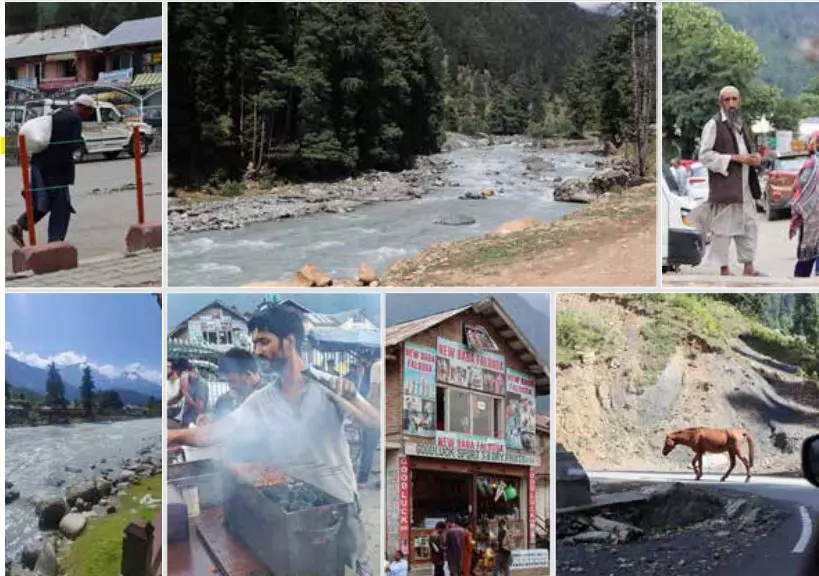Pahalgam Terror Attack: A Nation Mourns
The dastardly terror attack in Pahalgam has eviscerated the peace in J&K — we need action, accountability, and strengthened solidarity with the people

Image Courtesy: Shutapa Paul
If you told me a few months ago that picturesque Pahalgam would be the site of unimaginable carnage, I would have scoffed. There was nothing to indicate that just over six months later, 26 innocent people would be mercilessly gunned down by terrorists. It’s incongruous to associate the serene Baisaran meadows of Pahalgam with the comforting blue waters of Lidder River running nearby, and the region guarded by the magnanimous Pir Panjal mountains, with savage terror and bloodshed. The balmy hospitality of the people, the jovial ponywallahs, the cool touch of the winds and the waters — I was lucky to have witnessed Kashmiriyat at its best.
The April 22 terror attack not only targeted Hindus, it also laid siege on the peace and prosperity that was gradually returning to Jammu and Kashmir. After years of relative calm, this dastardly act brought back decades-old dread and disquietude. 25 tourists from different parts of India — some working overseas and back home on vacation, several current and former government employees and security personnel, some on long-cherished family holidays, one on honeymoon — and a local ponywallah trying to save tourists, paid with their lives in this inscrutable incident. This attack that left women and children unharmed, choosing only Hindu men, was a calculated message to J&K and the nation — Kashmir can bleed again. We would be remiss to not also see the divisive nature of the attack. Terror attacks propelled by religion are only meant to cause a divide between communities. Terrorists are agents of chaos who revel in instilling fear and instigating hate. Their end goal and long-term mission is to turn neighbour against neighbour. In a diverse nation like ours, today matters of religion are a tinderbox. It can get you thrown out of residential quarters, cancelled on social media, and on a particularly unlucky day, religion can even get you killed.
The Pahalgam terror attack cannot be allowed to achieve its goal of heightening communal tensions and increasing polarisation. Kashmiri students are allegedly being harassed and evicted across India citing “security reasons” while bigoted news anchors brayed for blood and Israel-like solution for Pakistan. There is no doubt that the perpetrators of this horrific act must be brought to justice but let’s not absolve those in-charge of the security policy in the region. The attackers came dressed in army fatigues, carrying automatic rifles, they were well-versed with the terrain, had planned escape routes, and most definitely, had local support.
The Resistance Front (TRF), purportedly an off-shoot of the Lashkar-e-Taiba that came into effect after the abrogation of Article 370 in August 2019, has claimed responsibility for the attack. Indian officials have said that the Indian army has exchanged fire with Pakistani soldiers in Kashmir. So far, the Indian government has done well to exercise restraint and yet taken bold decisions such as demoting diplomatic relationship between both nations, repatriation of Pakistani military attaches, halting of the 1960 Indus Waters Treaty, and shutting down the Attari land-transit point. A war on Pakistan is not in our economic, political, or social interest — war will decimate J&K as we know it and will take its toll on the entire country.
Prime Minister Narendra Modi is right in promising that India will pursue the attackers till the ends of earth as we should; but there are several important questions that still need answering. Jammu and Kashmir would be one of the most militarily guarded regions in India; so how did this security breach take place? We don’t have exact numbers of the strength of the armed forces but reports suggest anywhere between 1.68 lakh personnel as noted in 2019 to over 3 lakh now including CAPFs (Central Armed Police Forces). When I visited Pahalgam last year, around the 5th anniversary of the abrogation of Article 370 and ahead of the state elections, there were armed personnel everywhere. It was quite unnerving for a civilian like me to casually buy my bread and snacks along with security personnel in army fatigues. Every few yards, there were armed personnel walking around with a rifle in hand. Was security tightened around the abrogation anniversary and because polls were in sight and the Amarnath Yatra was underway? Was the security bandobast currently reduced after the newly anointed Union Territory got its first elected government? This act of terrorism happened just over a month before the Amarnath Yatra, when, as per the government, the security was temporarily dialled down.
There must be accountability for the security lapses and intelligence failures that even allowed such a deadly act to transpire. We need a plan for creating reformed security protocols that serve as effective deterrents. We don’t need clarion calls for war or dramatic filmy dialogues — the citizens of India need to feel safe, we need to stand in solidarity with our brothers and sisters in Kashmir who have been sitting in vigils and professing their dissent against this attack. The terrifying pictures and videos of that horrendous day when 26 innocents were sacrificed on the altar of religion are etched in our minds. And so I share the pictures of the tranquil Pahalgam full of beauty, love, and Kashmiriyat — let’s also remember these images as we use this time to mourn, heal, and stand united as a nation.
The writer is an author and media entrepreneur. Views expressed are personal



